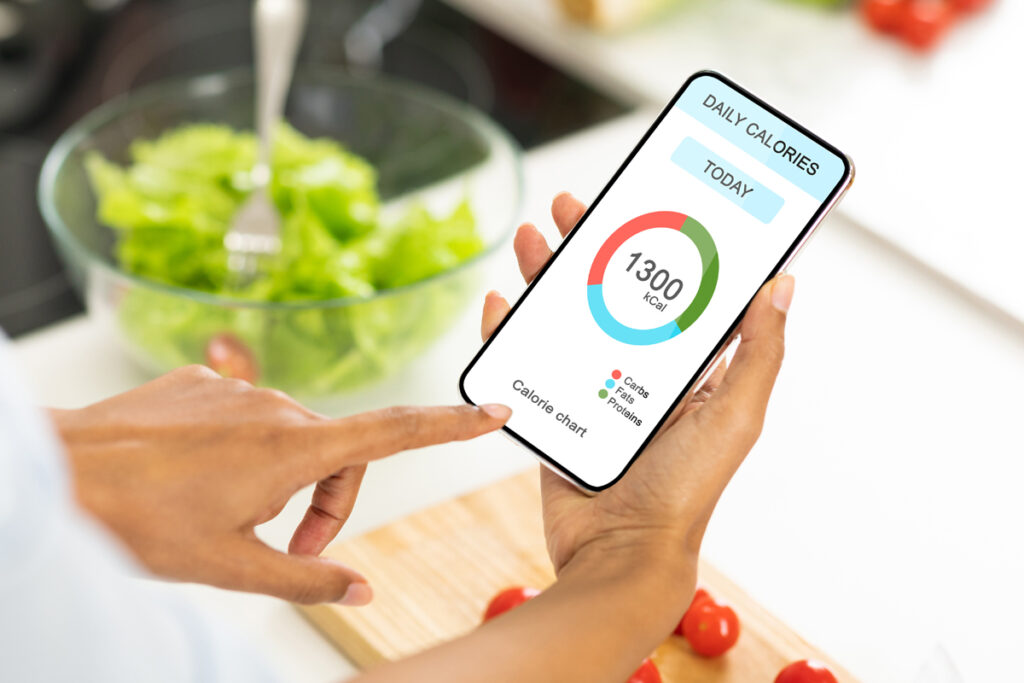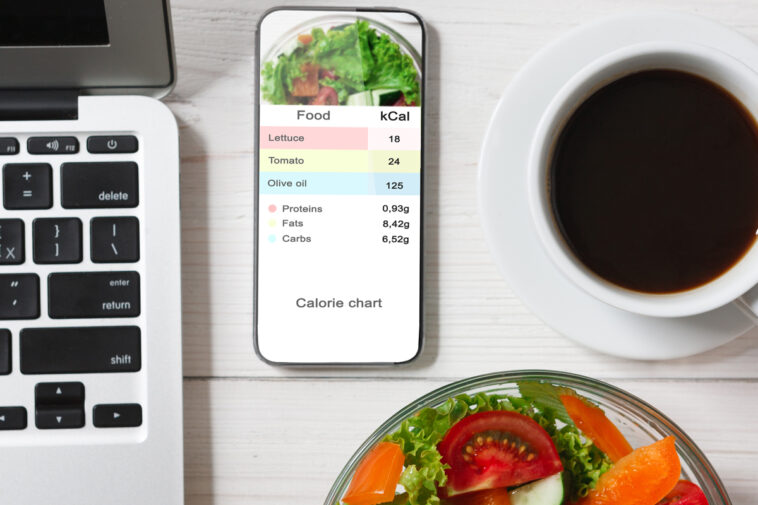Is it necessary to count your calories? How are you doing this? Read here what the pros and cons of keeping track of your macros are.
Do you want to lose weight or eat healthier? Calorie counting is a method to gain insight into how much energy you eat and drink and use for exercise and sports. In this article, you can read the pros and cons of counting calories and get useful tips.
Energy balance
The ratio between how much you eat and exercise is also called the energy balance. We speak of an energy balance if there is a balance between the amount of energy from food and the amount of energy your body uses.
Do you want to lose weight? Then, you have to use more energy than you take in. If you’re going to gain weight, you must eat more energy than you use. If you consume the same amount you need, your weight will remain stable, and you will not gain weight.
You can estimate the amount of energy you use using several calculations. This results in a certain energy requirement, and you can adjust your nutrition plan and eating pattern accordingly.
When making a nutrition plan, having insight into your energy intake is useful. Counting calories helps you find out, for example, why you have gained weight. For example, was this due to an incorrect calculation of your energy needs? Did you exercise too little, or did you unconsciously eat too much?
Count calories with an App

An app is a handy way to log your calorie intake. In addition to the calorie intake, you receive feedback about how much proteins, carbohydrates and fats your logged food contains. This will give you a better idea of whether you are taking more or less than you need.
What are the benefits of counting calories?
- Counting calories gives you insight into your diet. Insight into your energy intake can be useful for evaluating your diet. This way, you know better whether you are getting more or less than you need.
- Knowledge of the calorie content of different foods can prevent unexpected energy intake.
- Keeping track of your diet can be a stick behind the door to help you restrain yourself in the evening if you have already eaten too much. (“I’m already over my calories today, so I’m not having that cookie.”) But there are also disadvantages to this. Below, I will explain what they are.
What are the disadvantages of counting calories?
Counting calories is not a blessing in any case. Below, you can read the most important disadvantages of using calorie counting to lose weight:
- Logging your nutrition can provide a lot of guidance and structure. If this disappears, it can be difficult for some, and they have to think about what useful products are. The stick behind the door disappears, as it were. In addition, some people who spend a lot of time-consuming calories have not learned to listen carefully to their bodies. For example, how do you know if you’ve eaten enough without logging your food? And how do you ensure that you continue to maintain a healthy balance?
- Keeping track of your energy intake and expenditure is often not precise. Research shows that people can easily be off by 300-500 kilocalories. So, use an app or calculation to understand the ratio of macros to calories.
- Counting calories can turn into an obsession and can make you very rigid.
- Not only the calories are important, but also the ratio of macronutrients (proteins, carbohydrates and fats) and the intake of micronutrients. Focusing on calories can mean your macro and micronutrient intake is less than ideal.
- Counting takes time.
- You don’t always have the option to count calories and will sometimes have to guess.
Do you have to count all the calories to lose weight?
An important question that many people often ask me is whether they should count all their calories to lose weight.
Counting calories can help you gain more insight into your diet, but counting all calories is probably not the solution to successful weight loss.
How?
We favor using an app to gain insight into the nutritional values of products but do not overdo it and do not focus on counting all the calories. When counting all the calories becomes a goal, you are working on it all the time. For example, you think, “I’ll eat an apple turnover this afternoon, and then I’ll skip the rice tonight.” This often does not work in the long term.
Fortunately, it can also be done differently. With intuitive eating, you eat based on hunger and satiety. You do not exclude any food products. Research shows that intuitive eating is associated with a positive self-image, self-compassion, eating pleasure, body acceptance, life satisfaction and positive feelings.[1]
The following aspects play a role in intuitive eating:
- Do not exclude food products. Which, of course, does not mean that you eat a lot of unhealthy things.
- Make food choices for health reasons and enjoyment.
- Do not classify food products as good/bad or safe/unsafe, but look at food as nutritious/less nutritious, healthy/unhealthy or tasty/less tasty.
- Don’t use food to avoid negative emotions or suppress feelings with food.
- Respect your body, regardless of its weight and what it looks like.
- Exercise and sport are mainly for health reasons or fun.
- You can eat based on physical signals such as hunger and satiety.
- If you have eaten too much once, eat less at the next meal. This makes you flexible and adaptable to circumstances.
- You mainly choose the most filling products, such as protein-rich and fiber-rich food.
How does intuitive eating work in practice?
Many people over- or underestimate their calorie intake, meaning intuitive eating does not come naturally. Learning to eat based on hunger and satiety can take some time. The following 7 tips can help you with this.
Tip 1: the less distractions, the more attention you can focus on eating
Keep your focus on the food. Don’t do anything else during the meal. Put your phone away, and don’t eat in front of the TV. By focusing entirely on food, you can better register when you are getting full.
Tip 2: serve in the kitchen
By not putting the pan on the table, you reduce the chance that you will serve up extra food. So first, serve a portion of food in the kitchen and eat it mindfully.
Tip 3: eat slowly and chew more often
It takes the body about 20 minutes to indicate how full you are from food. Eating too quickly, therefore, increases the chance that you will eat too much.
You can eat more calmly by:
- Put down your cutlery regularly
- taking a sip of water in between
- chew one bite more often.
Tip 4: investigate your needs
Investigate which feelings, situations and thoughts precede the need to eat. The following questions will help you with this:
What do you really need at that moment? Do you need candy? Or do you need more comfort, company or fun? Are you really hungry? Is your stomach rumbling? Or is it a habit to eat because it is a certain time?
Examining your needs provides insight into yourself. This allows you to make a well-considered choice whether or not to act on it.
Tip 5: Accept your feelings
You can gain more control over something by accepting the situation. If you get a craving for something tasty, just notice it. Just as you would see, it is raining. Allow the urge to be there; let it be there. Stay level-headed, say to yourself, “Funny, I feel like having licorice,” and continue with your actions.
Tip 6: postpone your desires
If you notice a need for something tasty, postpone any snacking first. For example, ask yourself half an hour later whether that need is still as strong. The desire often subsides again. Does the appetite remain strong? Then have a small snack, enjoy it and put the rest away.
Tip 7: don’t wait too long to eat when you’re hungry
Don’t wait too long to eat if you are really hungry. It is good to listen to your body. In addition, not listening to hunger increases the risk of overeating.
Learn healthy eating habits.
In addition to intuitive eating, it is good to investigate which behaviors have caused you to gain too much weight. For example, do you often serve twice during dinner? Or do you eat too many snacks during the day?
It is much more useful to focus on breaking these unhealthy eating habits instead of eliminating treats and obsessing over calories. An apple turnover occasionally is no problem because it won’t make you fat. You will often notice that losing weight usually follows if you unlearn your unhealthy eating habits. The advantage of this method is that you don’t have to count calories obsessively.
Detect unhealthy eating habits and sustainably replace them with healthy choices.
Monitor eating behavior
It may be that you are not consuming enough healthy nutrients, and your diet does not match your current goals.
For example, you don’t get enough proteins, vegetables and fiber. An app is useful for gaining insight into your eating behavior.
The next step is to compare your eating behavior with the healthy eating guidelines. For example, do you eat too few vegetables and proteins? Then, create concrete goals to work on these points.
Another way to monitor your behavior is to write down your goals. For example, a plan could be: “From now on, I will no longer have sugar in my coffee.”
Small steps help
Sometimes, it helps to make small adjustments. For example, take 30+ cheese on bread instead of 48+ cheese to consume fewer calories and saturated fat. So you don’t always have to calculate everything completely. If you have some knowledge of the amount of calories in your diet, you can easily adjust your eating habits based on your current diet.
Don’t forget to get enough exercise.
In addition to a healthy diet, exercise is just as important. Choose something you can maintain to minimize the chance of a relapse.
Want to know more about how to lose weight successfully? Then, read this extensive article about losing weight, where all questions are answered.
7 statements about calorie counting

There are quite a few statements about calories floating around on the internet. Below, you can read the seven most important ones. Every claim is scrutinized critically.
Claim 1: “The number of calories in a product says nothing about how healthy it is.”
It is indeed true that you do not yet know how healthy a product is based on how many calories it contains. That is why we advise looking at individual food products, especially to see whether the product fits within a healthy diet.
Certain food products can be said to have a positive effect on health. You can think of vegetables, fruit and unsalted nuts. But here, too, there must be a certain balance. Of course, just eating apples won’t make you healthy.
Claim 2: “Carbs make you fat faster”
Proponents of the low-carb diet, particularly, believe that a “calorie is not a calorie.” The thinking is that a low-carb diet will make you lose weight much faster because it ensures a more stable insulin level.
Without the well-known peaks in blood sugar levels, you would burn more fat and store less fat. The theory sounds very good, but does it work so well to remove carbohydrates from your diet?
Is this correct?
It is true that if the insulin level rises due to the intake of carbohydrates, fat burning is temporarily inhibited. But this process recovers over a 24-hour period. In other words, over 24 hours, fat burning is virtually the same with a diet with a higher carbohydrate intake and the same calorie intake as with a low-carbohydrate diet. In addition, a low-carbohydrate diet is often unsuccessful in long-term weight loss.
A carbohydrate intake between 45 and 55 percent of your total calorie intake is preferable because this percentage is associated with the lowest risk of death. A person must consume sufficient proteins. Otherwise, you will lose muscle mass.
If you want to know more about the pros and cons of the low-carb diet, read the following article.
Claim 3: “Low-calorie products, such as diet products, are dangerous”
The third claim states that diet products make you fat and cause cancer. To what extent are these statements correct?
What are light products?
In light products, some of the sugars may have been replaced by a sweetener. Or the food product contains less fat than the regular variant. Another option is that the product contains at least 30 percent fewer calories than the standard product.
Light products do not make you fatter.
FYI: light products do not make you fatter. No substances exist in diet products, so you store fat much faster.
You may eat more diet products and consume too many calories. It is therefore important to pay attention to this.
Light products containing aspartame are not carcinogenic.
Based on hundreds of studies, it has been concluded that aspartame can be used safely for healthy people and that it is not the cause of MS, lupus, cancer and epileptic seizures, among other things. You must stick to the recommended daily amount.
You can read more information about aspartame in this article.
Claim 4: “The number of calories you eat says nothing about how many calories your body absorbs.”
The fourth frequently heard claim states that it takes more energy to digest proteins than fats and carbohydrates. In other words, the thermogenetic effect of proteins is higher. This effect is not included in the logging of food.
It indeed takes more energy to absorb proteins than fats. Only this difference is not that big. So, logging your nutrition is certainly useful.
Claim 5: “Some foods are addictive”
“Sugar is addictive” is another statement you often encounter online. However, this statement is not supported by science. The substance sugar is not addictive.
With a substance addiction, such as heroin, the dopamine flow is blocked. This means dopamine can no longer escape. The flood causes a euphoric effect. This causes the body to reduce dopamine production. This makes you want more and more of the substance. This process does not take place with sugar.
Learn more about this subject. Then, read the following article about whether there is such a thing as a sugar addiction.
Claim 6: “Counting calories undermines the pleasure of eating.”
Counting calories can undermine the pleasure of eating. This is especially true if counting calories becomes a goal and you can no longer let go.
Therefore, we are in favor of learning healthy eating habits and eating according to your feelings. Counting calories is a useful tool, but not a goal in itself.
Claim 7: “It’s not about calories but about how satisfying a food product is.”
This claim is incorrect. The energy balance is leading when losing weight. But it does help you enormously to choose food products that have a satiating effect, such as protein-rich foods and foods high in fiber, such as vegetables and whole grain products.






